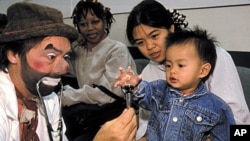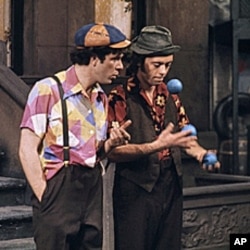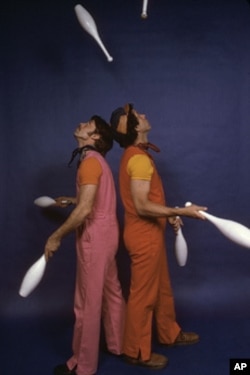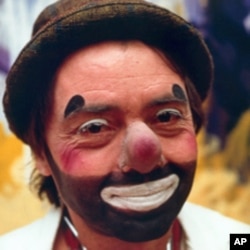Professional clown Michael Christensen doesn't just confine his act to the Big Apple Circus he co-founded. He also brings laughter to a place that is often badly in need of it: pediatric hospitals across the country.
Christensen's national organization, Clown Care, sends costumed circus performers on nearly 225,000 visits to ill children across the country.
Getting into the act
The arc of Michael Christensen’s circus career has taken some funny turns. Born in Walla Walla, Washington in 1947, he trained to be a traditional actor. But he got hooked on the circus spirit during the early 1970s, when he learned how to juggle from the San Francisco Mime Troupe, a politically radical ensemble of street performers.
That’s where he met and befriended juggler Paul Binder, who later joined him as a circus act and became his lifelong business partner as well. Together, the two set off for the streets of Europe, where they performed their juggling act everywhere from Paris to Istanbul.
By 1977, the two had returned to America and raised funds to start their own one-ring circus under a small green canvas tent in New York’s Battery Park City, in the shadow of the World Trade Center. They called it The Big Apple Circus.
"We took off," Christensen recalls. "A year-and-a-half later we were in Lincoln Center. What started out as a couple of ragtag brazen Americans juggling on the streets of Europe as a great adventure has ended up being a great New York institution."
Big Apple Circus
Today, more than 500,000 fans see the show every year during its 38-week tour. Christensen stresses that despite its success, the Big Apple Circus remains a non-profit, grassroots operation.
"We both decided when we created the circus that we wanted it to serve the communities in which we performed. This is important - having a direct, positive, supportive relationship with the community."
In that spirit, the duo launched "Circus of the Senses" in 1983, a special edition of the Big Apple Circus adapted for visually and hearing impaired children. They also started "Beyond the Ring," an afterschool program which teaches kids clowning, acrobatics and juggling. Christensen says circus arts offer children life skills such as teamwork, perseverance and calm flexibility in the face of the unexpected.
"If a club falls and hits the ground, or you drop it while juggling, instead of being embarrassed that you’ve made a ‘mistake,’ accept it, and find some fun thing to do with that," he says. "And all of a sudden the kid looks up and sees the audience go ‘Yeah, yeah!’ And there has been a shift in the child, a really fantastic one, that goes, ‘These aren’t mistakes. These are things that happen,’ and they can be the source of fun and delight."
Clown Care
But it was personal grief over the loss of his brother to cancer and the search for a larger purpose in life that inspired Christensen to start his own signature program.
Clown Care brings pairs of clowns and the levity they offer into pediatric hospitals. There are now over 80 "clown doctors" in facilities throughout America, and internationally, hospital clowning has become an established profession. Christensen, whose hospital clown persona is named "Dr. Stubs," says the work keeps him humble.
"In the first week, I came in contact with a nine year old who was heading to Philadelphia for a heart and lungs transplant. And I entertained him for 10 minutes, laughing through his oxygen mask and respirator. And four hours later, he passed," says Christensen. "And you just say, ‘Wow, to be with a child like that, and to fill those moments with joy, celebration, wonder, awe, fun, fantasy, laughter,’ and to know that you were one of the last people on this plane he encountered, and this was the quality of the exchange, what greater honor is there?"
Clown Care’s gifts don’t have to be raucous, or even funny. On a recent hospital visit he and his partner peered through the doorway of a 10-year-old boy’s hospital room to see him peacefully sleeping while his mother stroked his head.
"The scene is beautiful and so elegant and so touching. And you take a breath and we played a song. My partner has a ukulele and he just played a lovely song and I was simply with him and present. And we simply added the music, the appropriate music, that would complete that moment in front of us."
Clown 'doctor'
Christensen believes that clowns achieve much of their humor - and perhaps their healing power - by acting in ways that seem inappropriate.
He might enter a sick child’s room and walk right into a wall, or parody doctors by giving a medical exam to a rubber chicken. He is also aware that children - especially sick children - are often given little power over their lives. So he always asks permission of the child before the room, and sometimes switches roles with a child by acting benignly helpless when at the bedside.
"Now, all of a sudden, I am the one who needs the help and they become the all-knowing authority. Even in something as simple as ‘Do I have my hat on right?’ ‘Is everything okay?’ and they say ‘You have to button that,’ and ‘You’ve got it all wrong!’ And before you know it, they are sitting up in the bed taking charge. And medical people have told us oftentimes this is a turning point in someone’s illness where they have organized themselves to take charge."
For his pioneering Clown Care program, Christensen has received the Raoul Wallenberg Humanitarian Award, the Red Skelton Award and Parenting Magazine’s Lifetime Achievement Award.
Christensen’s hospital work has not been limited to children. He offers experimential group workshops that teach the value of playful improvisation and empathic communication to doctors, nurses and health administrators. Indeed, for Christensen and the thousands of people who have been touched by his work, play can be serious business.








